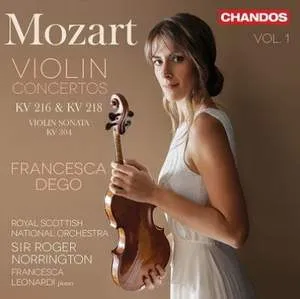
Mozart Violin Concertos Nos 3 & 4*; Violin Sonata No. 21** Francesca Dego (violin); **Francesca Leonardi (piano); *Royal Scottish National Orchestra/Roger Norrington Chandos CHAN 20234 56:26 mins
Here we truly have the best of all worlds. Those for whom the heartfelt radiance of old-school Mozart still holds a special appeal will find in Francesca Dego a kindred spirit – her enraptured sense of musical line and gently cushioned sonority are balm to the senses. There is also an engaging freshness and chamber-scale, transparent intimacy about these performances, reminiscent of the pioneering, scaled-back orchestras of the 1960s and ’70s.
Historically informed practice is also warmly embraced – Roger Norrington replicates the kind and scale of orchestra Mozart employed in Salzburg, with violins divided left and right, and ensures that details of articulation, ornamentation, tempo, use of vibrato and bowing style are thoroughly authentic. Yet, as he points out in his performance notes, the overall aim was not to make the music sound ‘scholarly’ or ‘correct’, but brilliant, touching and exciting. And that is the resounding triumph of this recording.
Dego’s tonal sophistication, ear-ringingly true intonation, glowing phrasal suppleness and almost impossibly beautiful timbre combine to create a Mozartian soundworld of seamless perfection. Compared even to such exalted golden agers as Oistrakh, Grumiaux and Francescatti, Dego seduces the senses with sleight-of-hand dynamic inflections, bewitching rate-changes of vibrato and playful musical asides (especially delightful in the finale of K216) that are simply in a class of their own.
Dego also ensures that stylistically sensitive cadenzas by Franco Gulli appear to grow naturally out of what has gone before, rather than as an excuse for soloistic pizzazz. Her velvety, melt-in-the-mouth cantabile possesses a sinewy allure, exchanging chest-beating 19th-century rhetoric for chamber-scale finesse and poetic insight, perfectly balanced as though emerging magically from within the orchestra’s ranks by expert sound team Rachel Smith and Ben Connellan.
There is a strong sense of collaboration here, illuminated by moments of cherishable musical correspondence between soloist and orchestra. Norrington’s boundless expertise and contagious enthusiasm inspire the Royal Scottish National Orchestra players to give of their radiant best, setting up, meticulously matching and weaving in and out of the solo line with captivating suppleness and alertness. Above all, there is a youthful buoyancy and radiant sparkle about these performances that captures the very essence of Mozart’s Salzburg style.
The magic continues with Mozart’s cherishable E minor Sonata K304. Here Dego reduces her vibrato to exquisite, micro-fine shadings and gently decorates her line in the opening movement’s repeats, resulting in a captivating sense of the music possessing an organic, self-generating flow. There is a time-suspending moment in the second of two movements where Mozart transforms the mood into a radiant E major, and here, following Francesca Leonardi’s heavenly timing of the piano’s gentle pulsations, Dego’s enraptured inwardness and sensational bow control creates the impression she is merely breathing on the strings.
Julian Haylock